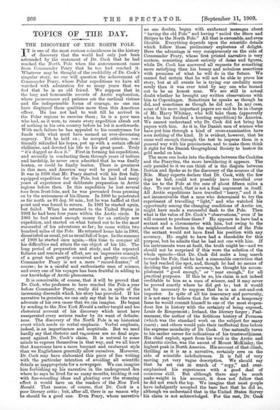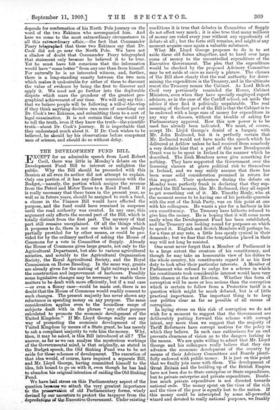TOPICS OF THE DAY.
THE DISCOVERY OF THE NORTH POLE.
IT is one of the most curious coincidences in the history of discovery that the world had only just been astounded by the statement of Dr. Cook that he had reached the North Pole when the announcement came from Commander Peary that he too had reached it. Whatever may be thought of the credibility of Dr. Cook's singular story, no one will question the achievement of Commander Peary, whose Polar expeditions we have all watched with admiration for so many years that we feel that he is an old friend. We suppose that in the long and honourable records of Arctic exploration; where perseverance and patience are the cardinal virtues and the indispensable forms of courage, no one can have displayed these qualities more than this American officer. He has not had to wait till he arrived in the Polar regions to exercise them ; he is a poor man who had, as it were, to create every expedition afresh out of nothing in his own country before he led it northwards. With each failure he has appealed to his countrymen for funds with what must have seemed an ever-decreasing cogency. Yet he held on ; he accepted criticism, con- tinually rekindled his hopes, put up with a certain official chilliness, and devoted his life to his great quest. Truly " it's dogged as does it." First in forming his expeditions, and secondly in conducting them through years of tedium and hardship, he never once admitted that he was finally beaten, or could be finally beaten. There is greatness in this man, and America may well be proud of him. It was in 1898 that Mr. Peary started with his first fully equipped expedition for the Pole, but he had had many years of experience and deliberate preparation in Arctic regions before then. In this expedition he lost several toes from frost-bite, and he was prevented from pressing on by the seriousness of his illness. In 1900 he penetrated as far north as 83 deg. 50 min., but he was baffled at that point and was forced to return. In 1901 he started again, but failed. When he returned to the United States in 1902 he had been four years within the Arctic circle. In 1905 he had raised enough money for an entirely new expedition, and started on what turned out to be the most successful of his adventures so far; he came within two hundred miles of the Pole. He returned home late in 1906, dissatisfied as usual, yet as usual full of hope. In the summer of 1908 he started once again,—this time to conquer all his difficulties and attain the one object of his life. The long period of preparation and study, and the repeated failures and renewals of effort, are an impressive example of a great task greatly conceived and greatly executed. Commander Peary is not a mere " record-hunter," of course ; he is a careful and enthusiastic man of science, and every one of his voyages has been fruitful in adding to our knowledge of Arctic phenomena.
It is conceivable, of course, that it will be proved that Dr. Cook, who professes to have reached the Pole a year before Commander Peary, really did so, in spite of the increasing discredit which his story has provoked. If his narrative be genuine, we can only say that he is the worst advocate of his own cause that we can imagine. He began by sending to the New York Herald a rather turgid and too rhetorical account of his discovery which must have exasperated every serious reader by its want of definite- ness. The discovery of the North Pole is an historical event which needs no verbal emphasis. Verbal emphasis, indeed, is an impertinence and ineptitude. But we need hardly say that rhetoric and vagueness are no final argu- ment against Dr. Cook's claim. It is natural to some minds to express themselves in that way, and we all know that Americans have a more buoyant and exuberant style than we Englishmen generally allow ourselves. Moreover, Dr. Cook may have elaborated this piece of fine writing with the .particular intention of avoiding all scientific details as inappropriate for a newspaper. We can imagine him furbishing up his narrative in the underground den where he says he lived for so many months, tricking it out with fine-sounding ideas and gloating over the stunning effect it would have on the readers of the New York Herald. That means, of course, that Dr. Cook is a poor literary critic ; but, after all, there is no reason why he should be a good one. Even Peary, whose narrative no one doubts, began with exuberant messages about " having the old Pole " and having " nailed the Stars and Stripes to the North Pole." All that is excusable, and even likeable. Everything depends upon the Scientific details which follow these preliminary explosions of delight. Here the advantage is very conspicuously on the side of Commander Peary, whose first printed narrative is very austere, consisting almost entirely of dates and figures, while Dr. Cook has answered all requests for something more satisfying than his breezy and nebulous assertions with promises of what he will do in the future. We cannot feel certain that he will not be able to prove his story, but at all events he is trying our credulity more sorely than it was ever tried by any one who turned out to be an honest man. We are still in actual doubt whether he brought any written observations with him to Copenhagen. Sometimes he speaks as though he did, and sometimes as though he did not. In any case, some of his more important papers are said to be in charge of Mr. Harry Whitney, who will take them (apparently when he has finished a hunting expedition) to America. We cannot understand why Dr. Cook did. not bring his papers with him. As it is, the Danish men of science who have put him through a land of cross-examination have seen nothing of the kind. It is evident, however, that he came well enough through the test to impress them in a general way with his genuineness, and to make them think it right for the Danish Geographical Society to bestow its gold medal on him.
The more one looks into the dispute between the Cookites and the Pearyites, the more bewildering it appears. The only parallel to it we can think of is the dispute between Burton. and Speke as to the discovery of the sources of the Nile. Many experts declare that Dr. Cook, with the few dogs he had, could not possibly have travelled over the ice to the Pole at the rate of about fifteen miles a day. To our mind, that is not a final argument in itself. All Arctic expeditions have travelled " heavy," and it is not inconceivable that a man who determined to try the .experiment of travelling "light," and who watched his opportunity among the changing conditions of Arctic ice, might have made a successful dash to the Pole. Then what is the value of Dr. Cook's " observations," even if he will consent to produce them ? He appears to have had a sextant and a chronometer with him, but owing to the absence of an horizon in the neighbourhood of the Pole the sextant would not have fixed his position with any accuracy. He ought to have had a theodolite for this purpose, but he admits that he had-not one with him. If his instruments were at fault, the truth might be and we should not be surprised if this were the solution of the whole episode—that Dr. Cook did make a long march towards the Pole, that he had a reasonable conviction that he had reached the spot, and, though he had no means of deciding the point with accuracy, he thought his accom- plishment " good enough," or " near enough," for all practical purposes. If this be so, his claim is not indeed creditable to him as a man of science, and it may never be proved exactly where he did get to ; but it would not be necessary to suppose that he is an out-and-out impostor. In spite of all his inaccuracy and perversity, it is not easy to believe that for the sake of a temporary fame he would commit himself to one of the most stupen- dous lies in history with the certainty of being exposed. Louis de Rougemont ; Ireland, the literary forger ; Psal- manazar, the author of the fictitious history of Formosa (which was the standard work on the subject. for many years) ; and others would pale their ineffectual fires before the supreme mendacity of Dr. Cook. One naturally turns to his earlier career for indications of his trustworthiness. His chief exploit, apart from his work in the Arctic and Antarctic circles, was the ascent of Mount McKinley, the highest peak in North America. His account of that climb, thrilling as it is as a narrative, certainly errs on the side of scientific indefiniteness. It is full of very moving yet very vague description. We should say that he set out in search of " copy," and over- emphasised his experiences with a good deal of conscious skill. But although there may be much make-weight in his account, it does not follow that he did not reach the top. We imagine that most people have indulgently accepted the bare fact that he did so, although we understand that in the United States Survey his claim is not acknowledged. For the rest,. Dr. Cook depends for confirmation of his North Pole journey on the word of the two Eskimos who accompanied him. And here we come to the most extraordinary circumstance in all this extraordinary affair,—the fact that Commander Peary telegraphed that these two Eskimos say that Dr. Cook did not go near the North Pole. We have not a shadow of doubt that Commander Peary telegraphed that statement only because he believed it to be true. Yet he must have felt conscious that the information would have " come better " from any one than from himself. For naturally he is an interested witness, and, further, there is a long-standing enmity between the two men which makes it undesirable for either of them to discount the value of evidence by being the first to discover and apply it. We need not go further into the deplorable dispute which mars the grandeur of the greatest geo- graphical achievement of our time. We will only say this : that we believe people will be following a will-o'-the-wisp if they think anything decisive can come of searching out Dr. Cook's two Eskimos, and submitting them to a sort of legal examination. It is not certain that they would try to tell the truth, *even if they knew the truth—the scientific truth—about Dr. Cook's journey. It is improbable that they understand much about it. If Dr. Cook wishes to be believed, he should lay his observations before competent men of science, and should do so without delay.







































 Previous page
Previous page